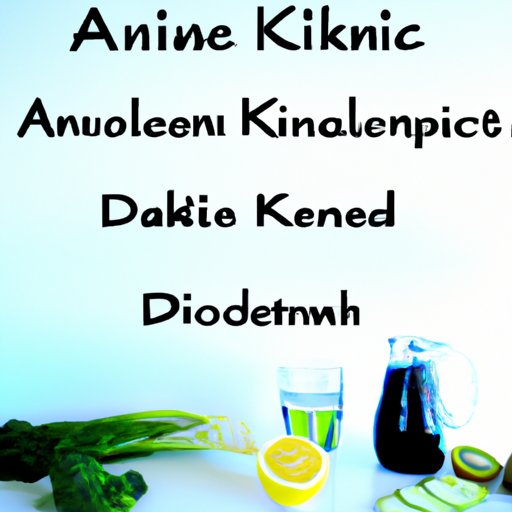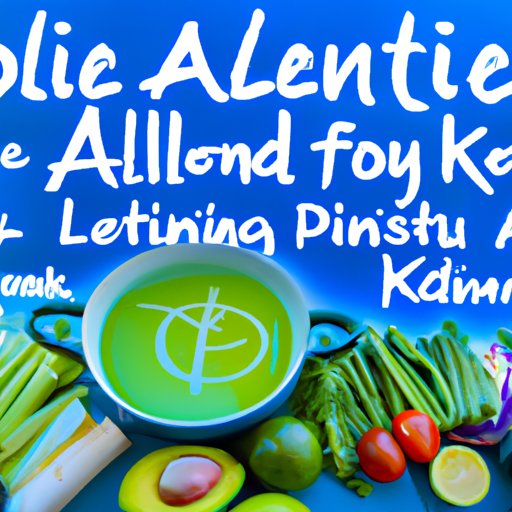Introduction
An alkaline diet is a lifestyle that focuses on eating foods that promote an optimal acid-alkaline balance in the body. The goal of an alkaline diet is to reduce inflammation, improve digestion, and boost overall health. Although the alkaline diet has been around for centuries, it’s recently gained popularity as a way to support healthy living.
A Beginner’s Guide to the Alkaline Diet
The alkaline diet is based on the idea that our bodies have a natural pH level, or acid-alkaline balance. Eating foods that are low in acidity and high in alkalinity helps to maintain this balance and keep our bodies functioning optimally. Let’s take a closer look at what foods are alkaline and how to adjust your diet for an alkaline diet.
What Foods Are Alkaline?
Foods that are considered alkaline are those that are high in alkalizing minerals such as calcium, magnesium, and potassium. These foods include fruits, vegetables, nuts, seeds, legumes, and some dairy products. Examples of alkaline foods include spinach, kale, avocado, almonds, lentils, and yogurt.
How to Adjust Your Diet for an Alkaline Diet
If you’re looking to incorporate an alkaline diet into your lifestyle, the first step is to make sure you’re consuming enough alkaline-forming foods. Aim to fill your plate with at least 70% alkaline-forming foods, such as fruits, vegetables, nuts, and legumes. You should also limit your intake of acidic-forming foods, such as red meat, processed foods, and refined sugars.
Alkaline Diet: What You Need to Know
Common Misconceptions
Although the alkaline diet has become increasingly popular in recent years, there are still misconceptions about what it entails. One common misconception is that the alkaline diet requires you to completely eliminate acidic-forming foods from your diet. However, this is not the case. The key to following an alkaline diet is to focus on eating mostly alkaline-forming foods while limiting your consumption of acidic-forming foods.
Potential Benefits of an Alkaline Diet
Proponents of the alkaline diet claim that it can help reduce inflammation, improve digestion, boost energy levels, and support overall health. While there is limited scientific research to back up these claims, many people report experiencing positive benefits when following an alkaline diet.

The Science Behind an Alkaline Diet
How an Alkaline Diet Affects the Body
The alkaline diet works by helping to maintain the body’s natural pH level, which is slightly alkaline. Eating alkaline-forming foods helps to keep the body’s pH levels balanced, which in turn helps to reduce inflammation and boost overall health.
Evidence Supporting the Benefits of an Alkaline Diet
While there is limited scientific evidence to support the claims of an alkaline diet, one study did find that participants who followed an alkaline diet for two weeks had significantly lower levels of inflammation markers than those who followed a typical Western diet. This suggests that an alkaline diet may be beneficial for reducing inflammation and promoting overall health.

How to Incorporate an Alkaline Diet into Your Life
Tips for Eating an Alkaline Diet
Eating an alkaline diet doesn’t have to be complicated. Here are some simple tips for getting started:
- Focus on eating whole, unprocessed foods.
- Fill your plate with at least 70% alkaline-forming foods.
- Limit your intake of acidic-forming foods, such as red meat, processed foods, and refined sugars.
- Drink plenty of water.
- Be mindful of portion sizes.
- Get plenty of exercise.
Simple Ways to Make the Transition Easier
Making the transition to an alkaline diet can seem overwhelming at first. To make the process easier, start by gradually adding more alkaline-forming foods to your meals and eliminating acidic-forming foods. It’s also helpful to plan ahead and pack healthy snacks for when you’re on the go. Finally, don’t be afraid to experiment with different recipes to find ones that you enjoy.

Recipes for a Healthy Alkaline Diet
Breakfast Ideas
- Smoothie Bowl: Blend together banana, almond milk, spinach, and chia seeds. Top with fresh fruit, coconut flakes, and hemp seeds.
- Overnight Oats: Soak oats overnight with almond milk, chia seeds, and honey. Top with fresh fruit and nuts.
- Avocado Toast: Spread mashed avocado on whole grain toast and top with tomatoes, feta cheese, and a sprinkle of sea salt.
Lunch and Dinner Ideas
- Quinoa Salad: Combine cooked quinoa with roasted vegetables, chickpeas, and a vinaigrette dressing.
- Stuffed Sweet Potatoes: Bake sweet potatoes and stuff with black beans, corn, and salsa. Top with Greek yogurt and cilantro.
- Veggie Bowl: Sauté vegetables such as mushrooms, bell peppers, and onions. Serve over quinoa or brown rice and top with a sprinkle of feta cheese.
Snack Ideas
- Apple slices with almond butter
- Carrot sticks with hummus
- Trail mix with nuts and dried fruit
- Yogurt with granola and berries
- Green smoothie
Conclusion
An alkaline diet is a lifestyle that focuses on eating foods that promote an optimal acid-alkaline balance in the body. Eating an alkaline diet can help reduce inflammation, improve digestion, and boost overall health. Although there is limited scientific evidence to support the claims of an alkaline diet, many people report experiencing positive benefits when following an alkaline diet. If you’re considering incorporating an alkaline diet into your lifestyle, remember to focus on eating mostly alkaline-forming foods while limiting your consumption of acidic-forming foods.
(Note: Is this article not meeting your expectations? Do you have knowledge or insights to share? Unlock new opportunities and expand your reach by joining our authors team. Click Registration to join us and share your expertise with our readers.)
